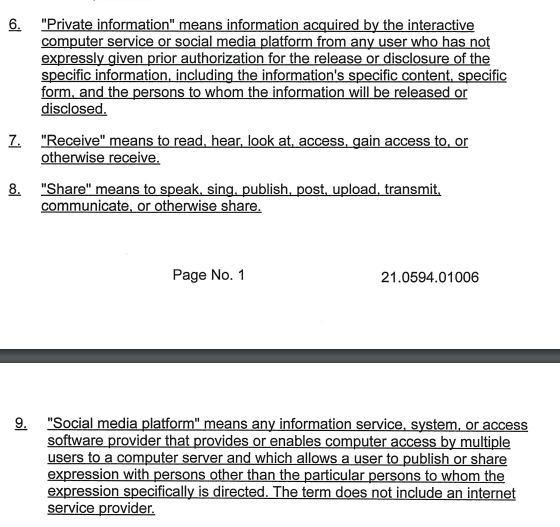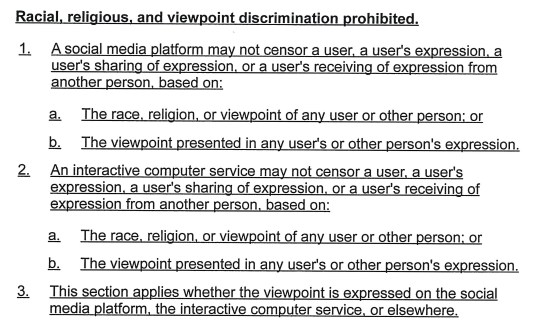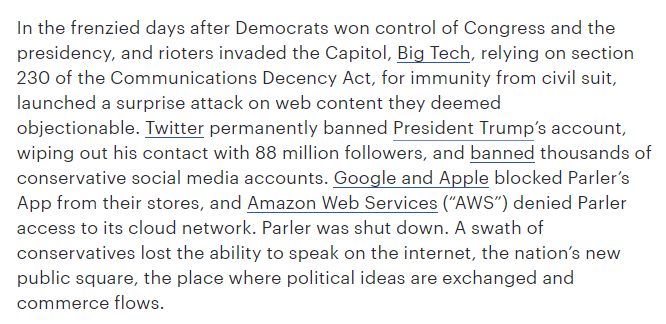
1/ Well look at what we have here. Phillip Hamburger rears his head again, butchering/lying about laws and precedents that he clearly doesn't understand (@berinszoka and I have put him under the broiler before: lawfareblog.com/wall-street-jo…)
wyofile.com/bills-bring-na…
wyofile.com/bills-bring-na…
2/ This Wyoming bill looks like a clone of the ND bill that I previously discussed here:
Anyway, since I already analyzed one of these stupid bills, you can go read that to learn why this one's also preempted and unconstitutional.
https://twitter.com/AriCohn/status/1362242569263054855.
Anyway, since I already analyzed one of these stupid bills, you can go read that to learn why this one's also preempted and unconstitutional.
3/ N.B., in that thread I noted that Hamburger's org, @NCLAlegal, was behind the bill. They emailed me to say "not true." I replied with the video of the ND legislator explicitly naming them as working with them on the bill.
I got no reply.
I got no reply.
4/ So take that as you will with respect to this bill, given that Hamburger is explicitly reported as having written it. At a bare minimum NCLA seems embarrassed of his work in this area--and for good reason. 

5/ Since the analysis of the bill tracks the analysis of the ND bill that I linked to above, let's focus on this:
Phillip Hamburger, a law prof and non-profit president, is astonishingly bad at law--and seemingly very dishonest.
Phillip Hamburger, a law prof and non-profit president, is astonishingly bad at law--and seemingly very dishonest.
7/ Note in particular Hamburger's quote at the end of that screenshot, contrasted here with the actual quote from Red Lion: casetext.com/case/red-lion-… 



8/ Anyone who has actually *read* the Red Lion decision can tell you that this was not a case about "private censorship" in a "medium open to all." It was about the Fairness Doctrine and FCC rules mandating that broadcasters air rebuttals from people covered on its broadcasts.
9/ Key word is "broadcasters." The Fairness Doctrine rules were upheld explicitly because it applied to broadcasters operating on public airwaves under license from the government, because broadcast spectrum is a publicly-owned and scarce commodity 



10/ In dropping the "not" in his citation to Red Lion, Hamburger dishonestly tries to obscure the entire basis of the Court's holding: that spectrum is scarce (and therefore licensed by the government) and thus the government may impose certain requirements on license-holders.
11/ Indeed, attempts to transfigure Red Lion's holding into some grand proposition that the First Amendment rights of some private actors may be curtailed to enhance others' has been rejected by the Supreme Court.
12/ For example, in Buckley v. Valeo, the Court noted thusly: casetext.com/case/buckley-v…
You would think that Phillip Hamburger, as president of the New Civil Liberties Alliance, would be aware of this, given that NCLA routinely cites to Buckley in its briefs.
You would think that Phillip Hamburger, as president of the New Civil Liberties Alliance, would be aware of this, given that NCLA routinely cites to Buckley in its briefs.

13/ There is simply no way that Red Lion is applicable to websites, which do not run on licensed and scarce public property. Rather, website owners have their own First Amendment rights inviolable by state legislatures who want to create a new Internet "fairness doctrine."
14/ Either Hamburger did not read (or understand) the precedents he cites, or he is deliberately and dishonestly misrepresenting them to serve his own purposes. Leaving out a key word from a quote leads me to believe the latter.
But either way, it's not a very good look.
But either way, it's not a very good look.
See what he did there? He omitted a word, and a word that completely changes the meaning of that line.
• • •
Missing some Tweet in this thread? You can try to
force a refresh









